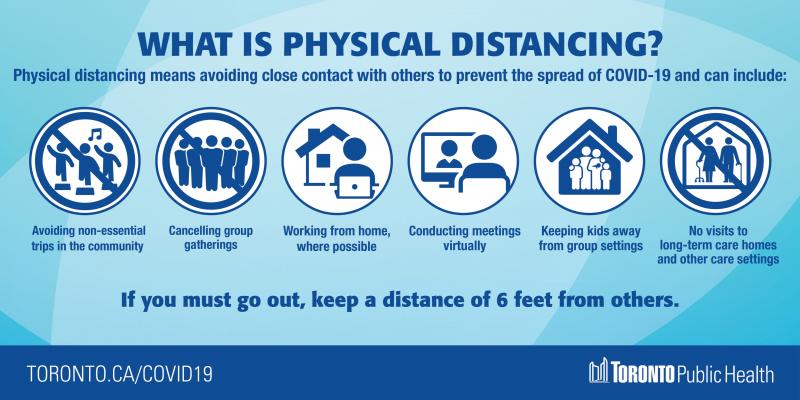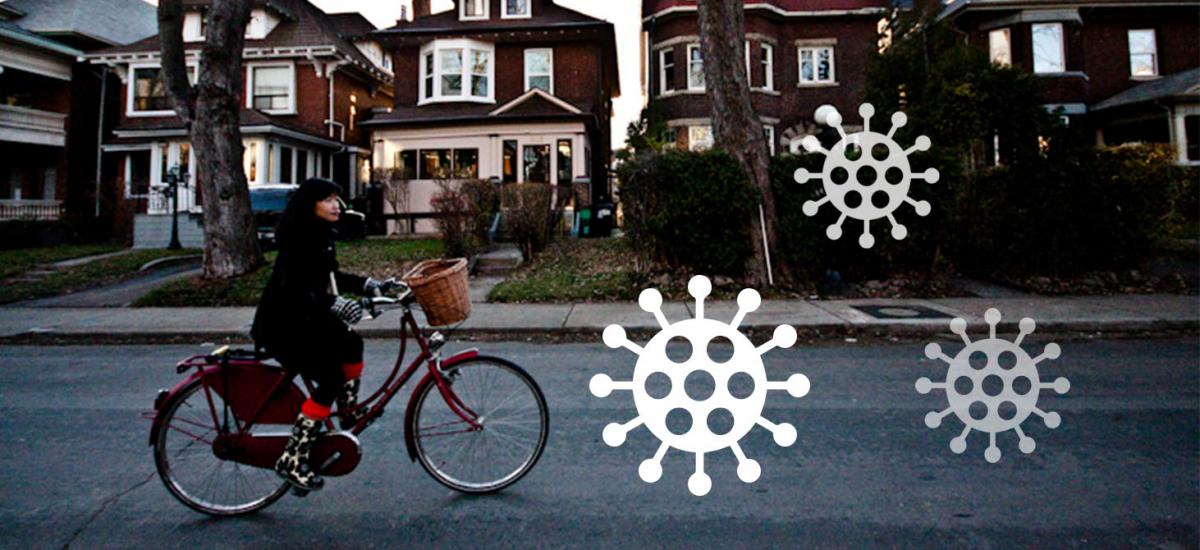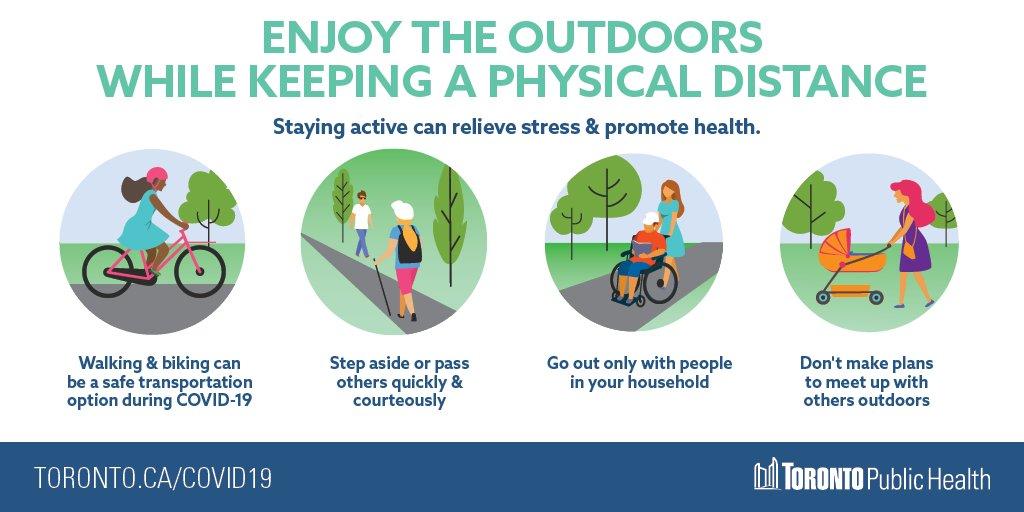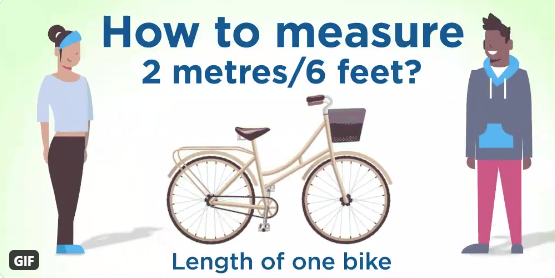
Cycling in the time of COVID-19

Contents: Cycling in the time of COVID-19
- Why do I need to practice “physical distancing”?
- So should I still ride my bike?
- Can I ride with groups or friends?
- I heard that parks are closed. Can I still ride on park trails?
- How do I run my errands?
- What is ActiveTO?
- Where can I get my bike repaired?
- Why have some places banned cycling?
- Additional Resources
*This page was last updated May 13, 2020*
Our daily lives have changed dramatically in the past few weeks as the Novel Coronavirus (COVID-19) continues to spread around the world. We’d like to help explain what the virus means for cycling in Toronto.
We urge our community to follow the most up-to-date public health guidelines around COVID-19 even if you’re symptom free, including avoiding non-essential trips and practicing physical distancing to help slow the spread of infection.
Note this information is up-to-date as of May 13, 2020. Information has been updated in accordance with the latest Toronto Public Health guidelines and information. A previous version posted on April 2 had been reviewed and verified by Toronto Public Health.
Don’t miss out on important information like this.
Subscribe to get updates from Cycle Toronto
Why do I need to practice “physical distancing”?
COVID-19 is a very infectious virus, for which no vaccine currently exists. Even people who appear healthy and symptom-free can pass along the virus.1 Current modelling suggests that without taking serious societal precautions like physical distancing, our health care systems will be overwhelmed and even risk the health and safety of people not infected with COVID-19.
The principles of physical distancing are:
- keep 2 metres (6 feet) apart from others
- stay at home as much as possible and avoiding all non-essential travel, except for:
- assessing healthcare or medication;
- shopping for groceries once per week;
- getting daily exercise
- avoid crowds and mass gatherings
As of April 2, 2020, you could be fined if you walk within 2 metres of someone else if you aren’t cohabitating.2 The City of Toronto can fine an individual up to $5,000.3 The province has ruled that gatherings must be limited to no more than five people.4
“Self-isolation” is different from “physical distancing.” Self-isolation includes staying home and not entering any public spaces, even to pick up necessities.
You should stay home and self-isolate if:
- You have returned from travel outside of Canada, including the United States in the last 14 days
- You have symptoms of COVID-19 which can range from: (fever, cough, muscle aches and tiredness, difficulty breathing)
- You have for a lab confirmed COVID-19 infection
- You have had been in close contact with someone who has COVID-19 or has symptoms
All persons entering Canada from abroad MUST self-isolate for 14 days per Federal law even if you are symptom-free. That means you must stay at home, do not go outside, do not have visitors, and avoid contact with others in your home. Read Toronto Public Health’s guide on how to self-isolate.
If you are self-isolating, you should not be out riding a bike.
So should I still ride my bike?
Yes!
As long as you are not infected with COVID-19, symptomatic, or otherwise self-isolating. As the City and Province begin the long process of reopening, Toronto Public Health has begun pivoting their messaging from “stay home” to “enjoy the outdoors while keeping a physical distance.” Exercise is still important for maintaining your physical and mental health.
Riding a bicycle is compatible with physical distancing. The City of Toronto even notes that 2 metres (6 feet) is about the distance of a bicycle (a practical reminder!):
Riding a bike extends how far you can travel to buy groceries or pick up prescriptions without sharing a vehicle. Cycling opens up our neighbourhoods when many of us are feeling locked in.
Before you go out and after you return to your place of residence, it is recommended to wash your hands often with soap and water for at least 15 seconds, or use an alcohol-based hand sanitizer if soap and water are not available, and avoid touching your face with unwashed hands. Be cautious using any shared facilities as surfaces frequently touched with hands are more likely to be contaminated.
Other measures to prevent infection, include:
- Cover your cough or sneeze with a tissue, then immediately throw the tissue in the garbage and wash your hands
- If you don’t have a tissue, sneeze or cough into your sleeve or arm
- Clean and disinfect frequently touched objects and surfaces (e.g., bicycle handlebars, brake levers and gear shifters)
Read about essential workers riding bikes
Can I ride with groups or friends?
No. Ride, but ride solo.
Cycle Toronto currently does not recommend group rides or social rides even if you are keeping 2 metres apart. The only exception is for people that you are currently residing with.
The Federal and Provincial sport governing bodies Cycling Canada and the Ontario Cycling Association have also cancelled/postponed all upcoming cycling events and races. As well, the Ontario Cycling Association recommends that clubs, athletes, and members “postpone or cancel any gatherings such as group rides and in-person group meetings for the immediate future” for the health and safety of their athletes and families.
I heard that parks are closed. Can I still ride on park trails?
On March 25, the City closed all City park amenities including playgrounds, sports fields, basketball and tennis courts, off-leash dog parks, skateboard and BMX parks, picnic areas, outdoor exercise equipment due to considerable concerns of people continuing to gather in groups.
At this point, city parks’ green spaces, including multi-use trails, currently remain open and accessible. Regular trail etiquette applies. Cyclists should not exceed 20km/h when travelling in a park according to the Parks By-laws, and must always yield to pedestrians.
Be prepared for multi-use trails to be busier than usual, particularly on weekends. Consider using cycling routes, as there is limited public space available to pedestrians that are also out seeking some fresh air. The Martin Goodman Trail and West Toronto Railpath are popular routes during normal operations and they are still quite popular. Consider using these routes during off-peak times to avoid crowds. Also take care to avoid pinch points, such as grade-separated multi-use crossings and pedestrian bridges in particular. Opt for cycling-specific crossings wherever possible to ensure physical distancing is possible.
It should be noted that unlike City of Toronto parks, National Parks including Rouge National Urban Park have been closed. While trails have not been physically closed off, “anyone considering a visit to Rouge National Urban Park at this time should cancel their plans.”
How do I run my errands?
We have an updated post on how to plan your bike route!
Many trips under 5km for groceries, prescriptions, and other essentials can easily be done by bicycle. Running errands by bike is often faster and more convenient than driving or taking public transit. While investing in a rack and bike-specific storage equipment is handy for frequent or longer trips, an ordinary backpack can get it done. We do not recommend looping bags over your handlebars as they can create a safety hazard by upsetting your balance or getting caught in your wheel.
Many more tips for shopping by bike
What is ActiveTO?
On May 6th, the City of Toronto announced ActiveTO, a plan to provide space for active transportation on Toronto’s streets now, as we recover from COVID-19, and beyond.
ActiveTO focuses on three approaches:
- Quiet Streets
- Major Street Closures
- Accelerate the Cycling Network Plan
There will be many more details on ActiveTO in the coming days and weeks.
Where can I get my bike repaired?
Last week, Cycle Toronto helped ensure that bicycle repair shops were included in the Province’s list of Essential Businesses during this emergency. As of April 3, bike shops are no longer explicitly identified, though they are included as "vehicle and equipment repair and essential maintenance and vehicle and equipment rental services."
Even during the COVID-19 pandemic, many essential activities happen on bicycle:
- cargo and food delivery
- picking up family groceries/medication
- commutes by workers to essential services
Cycling is a key part of our transportation network, and bike shops are vital to supporting that transportation network.
Many shops, including our supporters, are taking extra precautions including reducing hours, accepting business by appointment only, or offering home delivery.
If you need service or parts, call ahead or email to find out what your local bike shop’s current situation is.
Remember to practice physical distancing as much as possible to protect yourself and bike shop staff.
Why have some places banned cycling?
Jurisdictions around the world are experiencing various levels of infection and legally-enforced response to it. In some jurisdictions all public movement has been limited, not just cycling. Other jurisdictions have restricted sport cycling but not utilitarian cycling for essential travels as a precaution to prevent additional injuries and hospital visits while health care facilities are already strained.
For people living in Toronto decisions across all three levels of government are being driven by the best advice of public health officials for our situation. We are also not under general quarantine, and the importance of fresh air and exercise is still stressed.
Latest updates are available at toronto.ca/covid-19.
The way we advocate has changed a lot during COVID-19. We’ve moved quickly to adapt and transform our advocacy, but at the end of the day, we are still advocating for you: our members. As we’ve shifted our operations online, many of our usual fundraising events have been cancelled. If you value the work we do, please consider becoming a member or making a donation. Even $10 helps us have a strong voice at City Hall as well as supporting educational outreach, running cycling events, workshops and more.
Check out more cycling resources
Footnotes
1 Mike Stobbe, “More evidence that healthy people spread coronavirus, scientists say,” Global News, April 1, 2020.
2 Katherine DeClerq, “New rule prohibits walking within two metres of another person in Toronto parks,” CTV News, April 2, 2020.
3 City of Toronto, “Mayor Tory signs emergency order encouraging physical distancing in parks and public squares,” April 2, 2020.
4 Office of the Premier, “Ontario Prohibits Gatherings of More Than Five People with Strict Exceptions,” Ontario Newsroom, March 28, 2020.
5 Ben Spurr, “Speeding tickets are up nearly 30 per cent during the pandemic, stunt driving charges more than double, Toronto police say,” Toronto Star, April 1, 2020.
Photo by James Schwartz, icons by Arana Graphics.


